#esset
Explore tagged Tumblr posts
Text
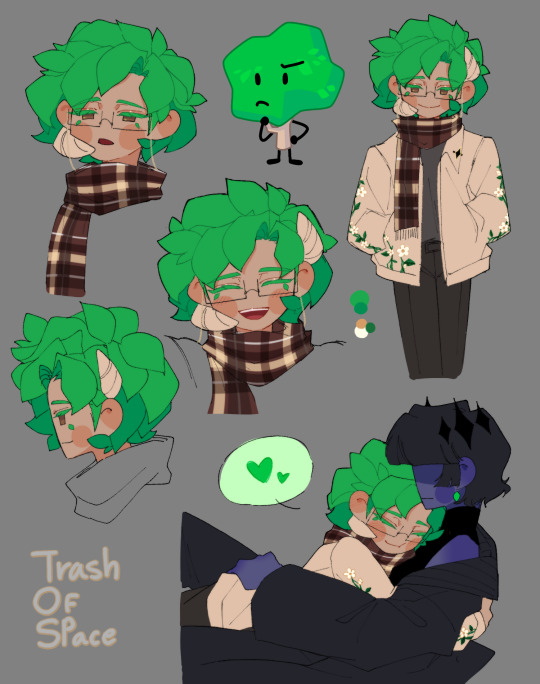
Gave him more of alt design with floofy hair-leaves
#tpot#bfb#tpot humanized#bfb humanized#tpot tree#tried to make his hair closer to his origianl esset (epic fail)#but had a fun time
155 notes
·
View notes
Text

Farah Esset at Sinead O'Dwyer FW 2024
83 notes
·
View notes
Text
you are NOT der weisse teufel. you will NEVER be der weisse teufel
2 notes
·
View notes
Text

@justseedee not dumb at all! Shion's only been explicitly mentioned once in Episode 4 Chapter 13 by Ritsu. He damaged the casino and Haru paid for it.
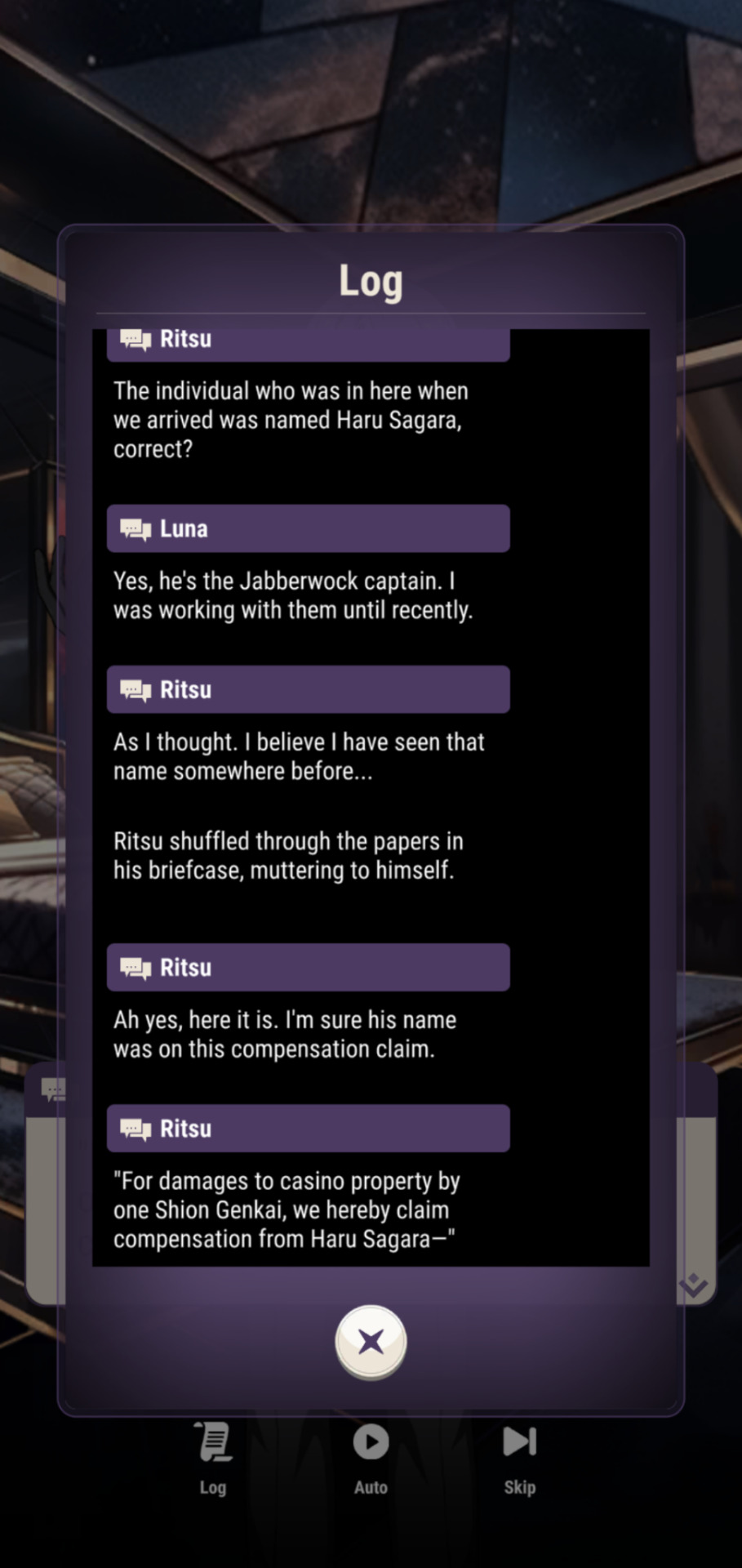

He's implicitly mentioned in Episode 12 Chapter 32 as having broken Haru's arm. Given his name is Shion Genkai and he's the destructive sort it's fair to assume that 'Gen' is Taiga's nickname for Shion.

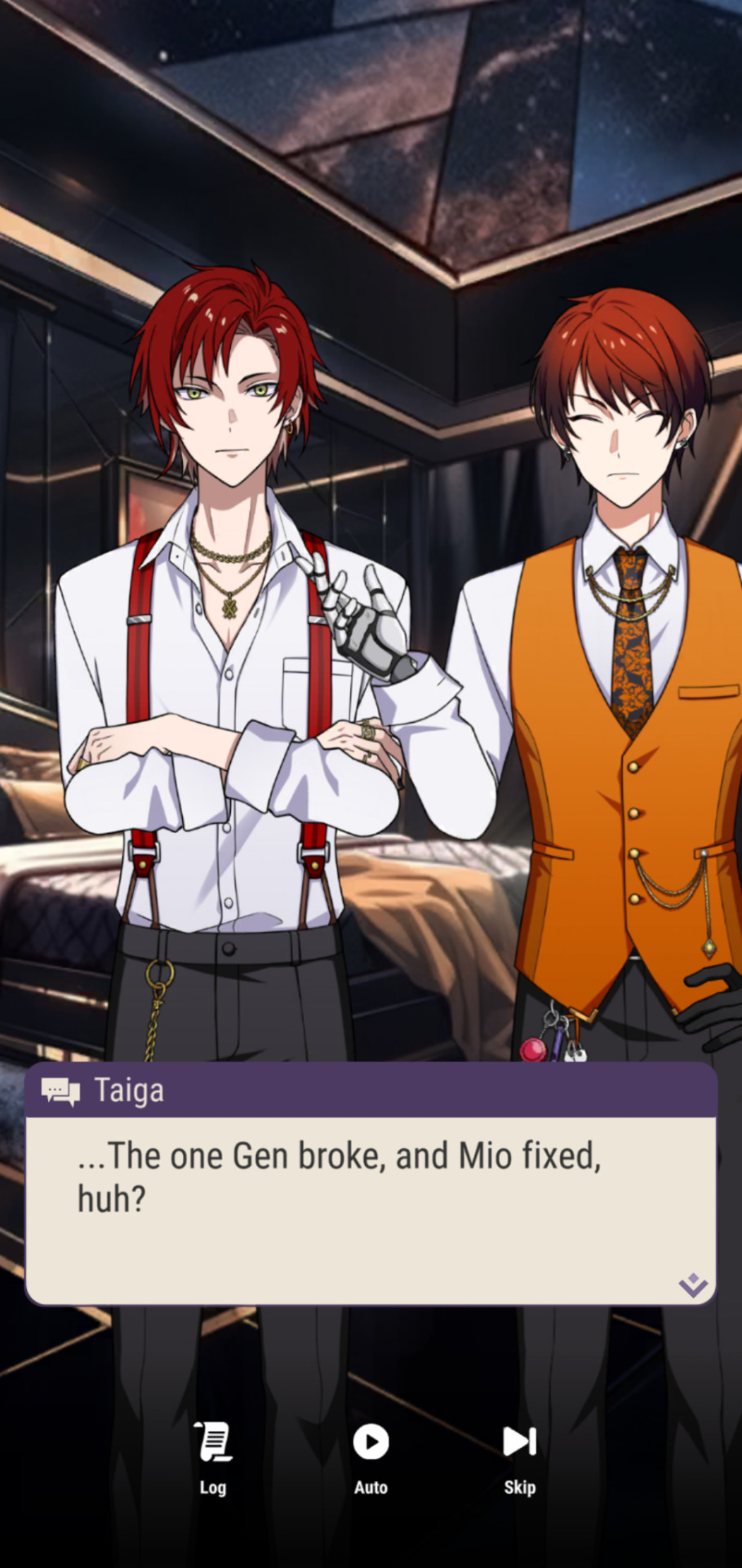
Romeo mentions people being interrogated and awaiting sentencing that Haru should be trying to help(and their being on trial like this is perhaps why Haru is in Jabberwock.) Haru says that Elias(the janitor) will take care of it. Haru mentions in the aforementioned chapter that Elias can't make any headway, so it's fair to assume Shion and 'Mio' are the ones on trial, who, according to Taiga, will die(based on Haru, possibly also including himself) if the coin flips wrong. I assume that Shion and 'Mio' are Haru's previous housemates, or they're otherwise from one or more of the defunct houses.
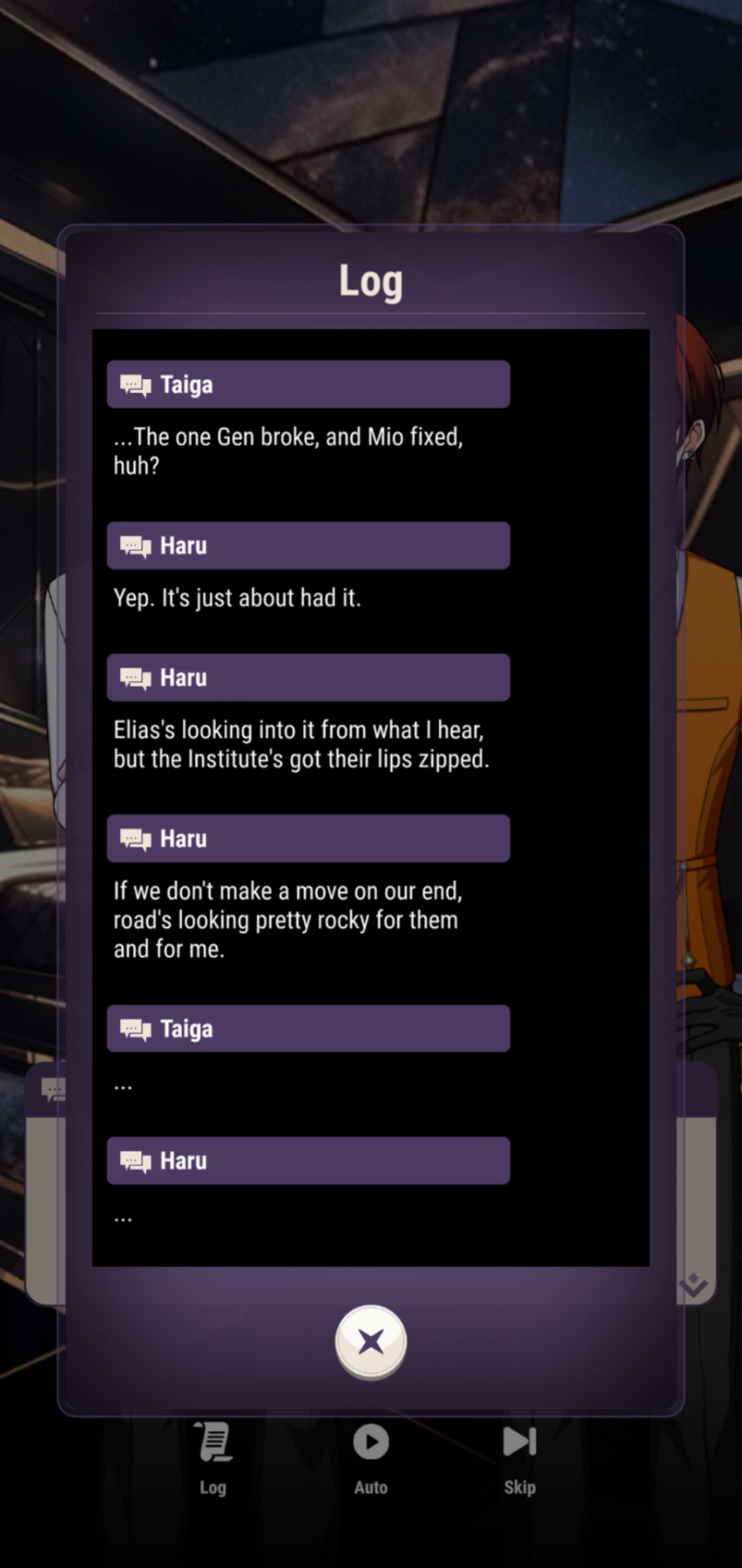

Episode 10 Chapter 6 has Romeo saying that 'they' will rot in prison if Haru doesn't do something. Based on the above Haru is realizing that Romeo is right, he--or all of them--need to make a move if they wanna save their friends from the Institute keeping them locked up or worse.
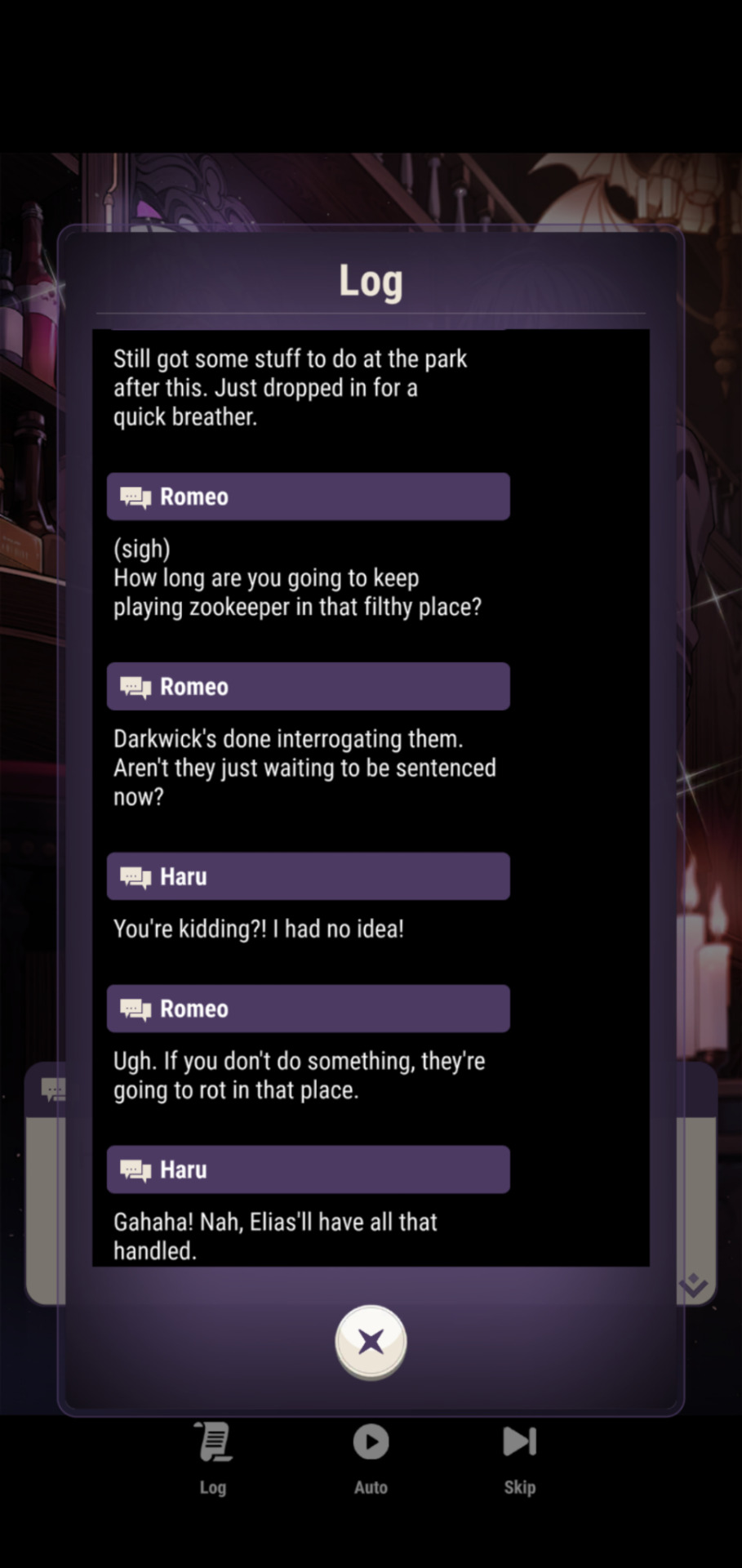
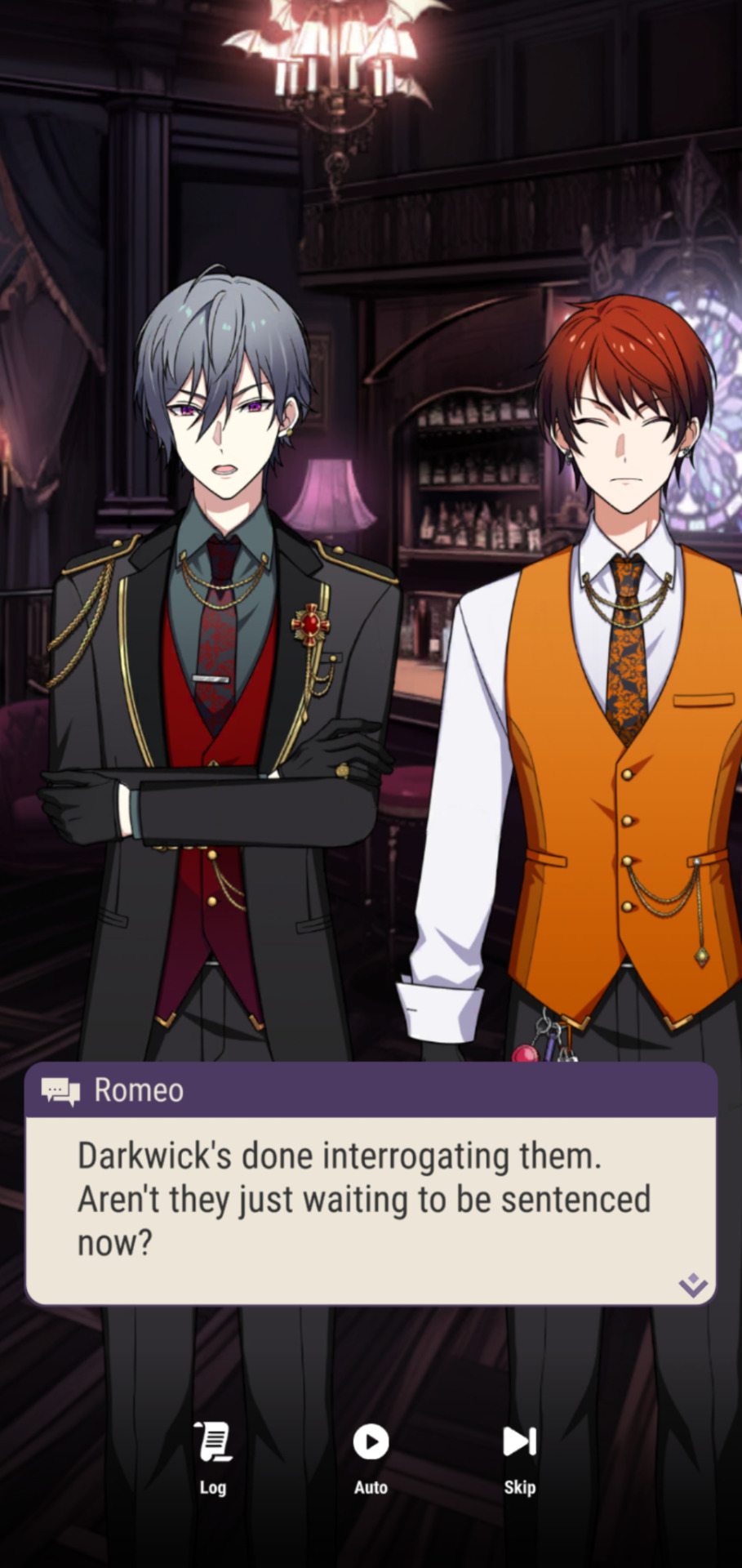
ESST CORRECTED ME ON THIS AND I NEVER EDITED THE POST BECAUSE I'M DUMB but the Dionysia students are the ones who broke out in the prologue, which actually makes it more likely that Mio, Shion, and perhaps Haru are from Dionysia, not Ultio! Thank you Esset for the correction!! The crossed out info below is incorrect speculation for lack of better explanation lmao.
Given we know the Dionysia students are alive and in recovery this leaves Clementia and Ultio. Considering Ultio houses the secret prison for dangerous anomalies and Elias said that Haru is good at training anomalies, on top of that the Clash was started when an Ultio student was murdered(and thus the Ultio ghouls may have done something out of very on-brand vengeance that's got them on trial) it's likely that Shion, 'Mio', and possibly Haru are all from Ultio. But that's just speculation!

Anyway that's all we've got on Shion so far! @shiongenkai pointed out that 'Genkai' means "Strange Sea" and has some suspicions that he's the mermaid(which could be in line with that Haru was worried about someone after Hyde told him about the mermaid situation at the beginning of Episode 7 Chapter 41) but we don't have anything else to go off of yet! (Shion means 'aster' by the way, like the flower!)
(i'd include like two more screenshots but i'm on mobile and the limit here is 10 compared to desktop's 30 so rip)
73 notes
·
View notes
Text
Reading the Ancient Magic Book Pages
I propose to you today a short analysis of the sections of text on the pages of the Ancient Magic book we find below the restricted section.
High-res images of the book’s pages have been shared by a kind soul. Here they all are:
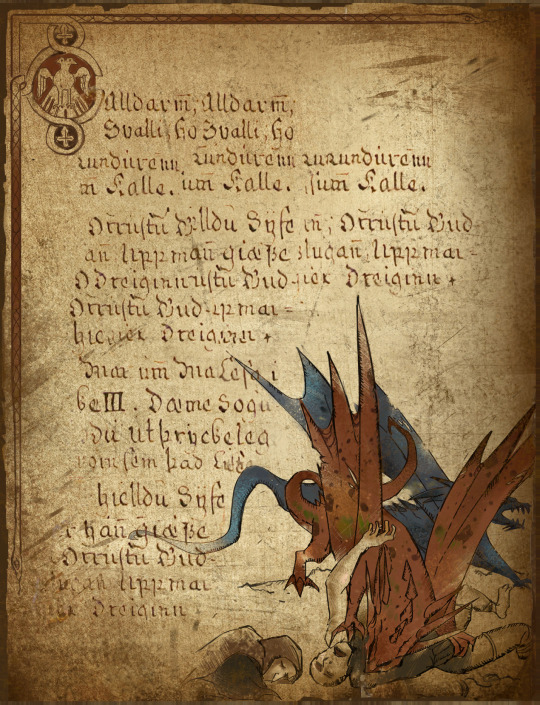
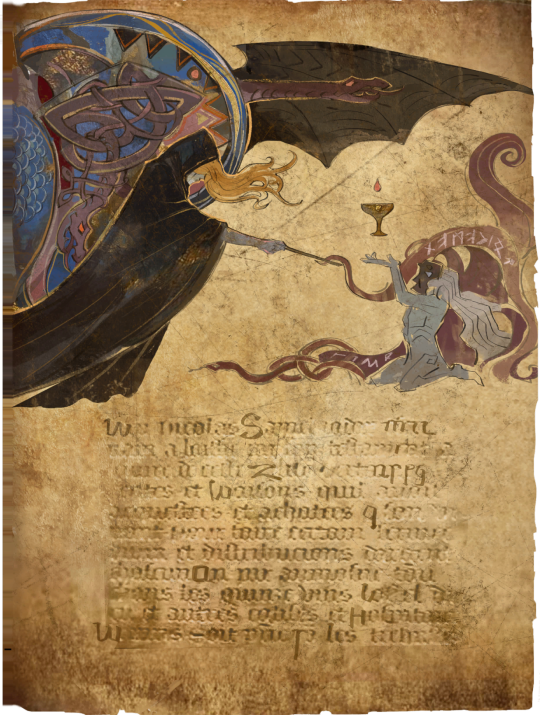
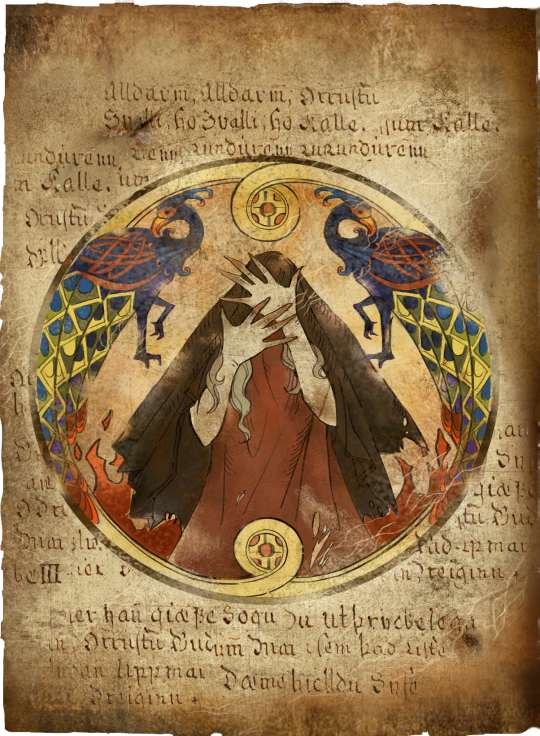

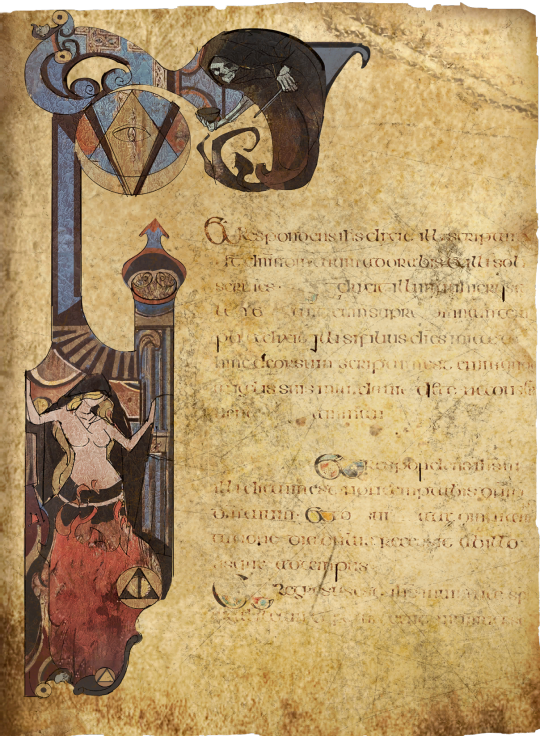
I was working on a completely different post when I realised that the text on the last 2 pages was easily readable and written in Latin. So I just did a quick search and discovered that these are verses from the Vulgate (4th century translation of the Bible in Latin), more precisely from the Gospel of Luke from the New Testament.
A bit more research and I could find exactly which source they got this text from: the Book of Kells, a Celtic Gospel book written in Latin and illuminated in the Insular style (a combination of Celtic and Anglo-Saxon styles). The precise origins of the Book of Kells are debated but many believe it was created around the year 800 at the monastery founded by St Colum Cille on Iona Island in western Scotland.
Here I put side by side the pages of the Ancient Magic book and the pages from the Books of Kells where the text is from (folio 204r and 275r):

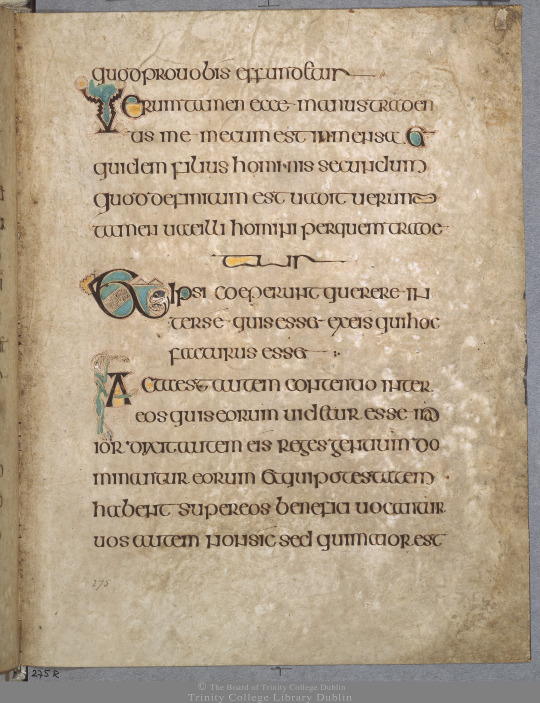

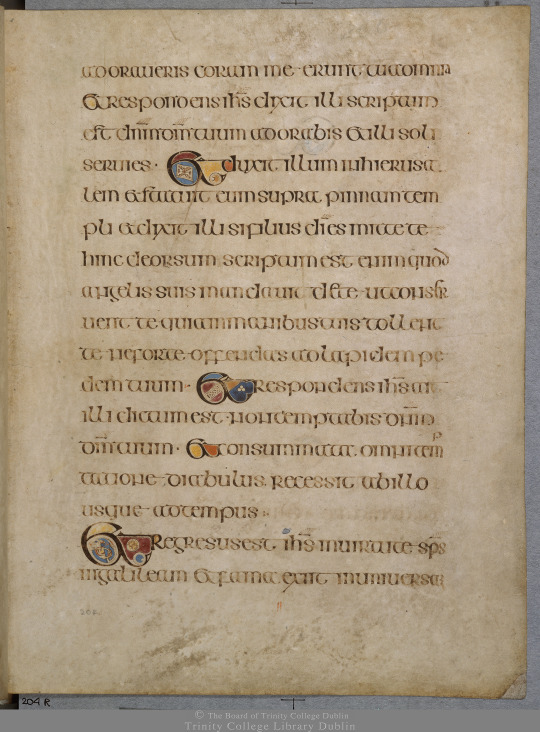
The verses they used are Luke 22:23
Et ipsi coeperunt quaerere inter se quis esset ex eis qui hoc facturus esset.
Which translates to:
And they began to enquire among themselves, which of them it was that should do this thing.
And on the second page, Luke 4:8-14
Et respondens Jesus, dixit illi: Scriptum est: Dominum Deum tuum adorabis, et illi soli servies. Et duxit illum in Jerusalem, et statuit eum super pinnam templi, et dixit illi: Si Filius Dei es, mitte te hinc deorsum. Scriptum est enim quod angelis suis mandavit de te, ut conservent te: et quia in manibus tollent te, ne forte offendas ad lapidem pedem tuum. Et respondens Jesus, ait illi: Dictum est: Non tentabis Dominum Deum tuum. Et consummata omni tentatione, diabolus recessit ab illo, usque ad tempus. Et regressus est Jesus in virtute Spiritus in Galilaeam, et fama exiit per universam regionem de illo.
Which translates to:
And Jesus answered and said unto him, Get thee behind me, Satan: for it is written, Thou shalt worship the Lord thy God, and him only shalt thou serve. And he brought him to Jerusalem, and set him on a pinnacle of the temple, and said unto him, If thou be the Son of God, cast thyself down from hence: For it is written, He shall give his angels charge over thee, to keep thee: And in their hands they shall bear thee up, lest at any time thou dash thy foot against a stone. And Jesus answering said unto him, It is said, Thou shalt not tempt the Lord thy God. And when the devil had ended all the temptation, he departed from him for a season. And Jesus returned in the power of the Spirit into Galilee: and there went out a fame of him through all the region round about.
I’m not christian and don’t know much about the Bible so I have no idea why they chose these particular verses. Maybe someone more educated than me will be able to chime in. My hunch is that these verses were just chosen at random from old manuscripts that the artists for the game were using as reference for the art style.
Now, since I was on a roll, I also looked at the text on the other pages. Pages 1 and 3 have some text written in some old form of Icelandic (figured that out from the few words I could sort of read on those pages). So I started looking into old Icelandic manuscripts but it took me a ridiculously long time to find the exact source the text is from! I was starting to go mad but here it is! It’s from an illustration of the Prose Edda found in the Icelandic manuscript ÍB 299 4to., in particular the illustration of the god Týr presented as Mars (folio 60r).
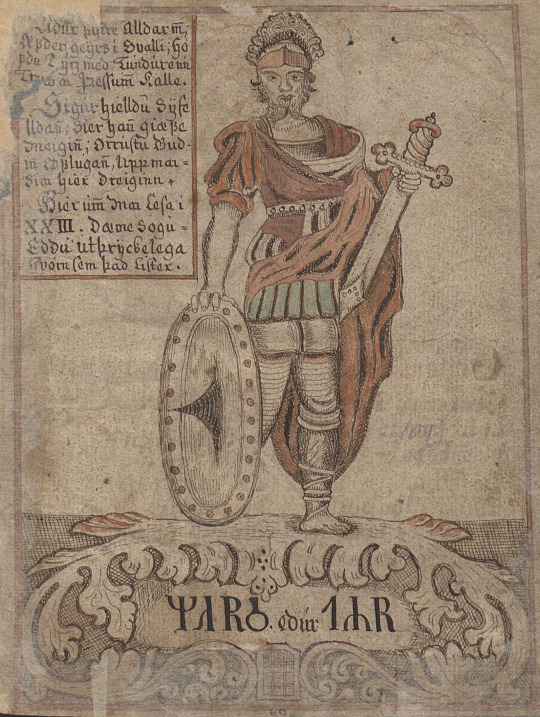


They took the short text in the little box and copy/pasted it mosaic style to give the illusion of the full page of text but you can see it’s just short sections that repeat over and over on both pages.
(To note: this manuscript is from 1764 so it’s sort of anachronistic for them to use this source for an Ancient Magic book that already existed in the Keepers time, meaning the Ancient Magic book is from the 15th century or older.)
Týr is one of the principal war gods in Norse mythology (alongside Odin and Thor) but he also presides over justice and the law. Latin texts often identified him as Mars (hence the subject of the illustration).
I could not find any transcription or translation of the text on the image, I could only decipher some words here and there such as «sigir hielldu» which google translate tells me could mean «victories held» in Icelandic. A bit further down there is «orrustu guð» which could mean «god of war». So it seems to be a short description of the god Týr and at the end there are roman numerals that identify the section in the Prose Edda where the story of Týr can be found.
Again, I can’t really see how this text makes particular sense in the context of the Ancient Magic book, probably just placeholder text from some of the sources they were studying as inspiration.
There is one last book page, but the text on this one is so blurred I didn’t even try to decipher it. Although I do note that the artist has traced over some letters which are: W S M I(?) I(?) I(?) Z N R(?) P(?) G W Q O U(?) H W R(?)

Don’t know… some of them are hard to read or could be not from the Latin alphabet. Again, I just can’t make sense of that. There are not enough vowels for it to be an anagram of an English or Latin phrase so… what else? I leave this mystery to others with more powerful brains than mine!
Anyway, this is it! Not really much to say about this but I think other people are also planning on looking into these book pages so maybe these findings can help them out!
102 notes
·
View notes
Text
my dealer: got some straight gas 🔥😛 this strain is called "ad familiares 8" 😳 you’ll be zonked out of your gourd 💯
me: yeah whatever i don’t feel shit
5 minutes later: dude i swear i can see the open wound at the heart of this correspondence
my buddy caelius pacing: exanimatus tuis litteris, quibus te nihil nisi triste cogitare ostendisti neque id quid esset perscripsisti neque non tamenquale esset quod cogitares aperuisti,
23 notes
·
View notes
Note
pears are so mushy they are one of the worst fruits
Spero te pati, misera creatura; etiam infernum tibi poena nimis benigna esset.
#dan and phil#father philip#amazingphil#daniel howell#phan#phil lester#dan howell#sister daniel#amazing phil#dan is not on fire
20 notes
·
View notes
Note
all tenses + all moods
Indicative active:
present
I - o
you - s
he/she/it - t
we - mus
you pl - tis
they - nt
Perfect
I - i
you - isti
he/she/it - it
we - imus
you pl - istis
they - erunt
Imperfect
I - bam
you - bas
he/she/it - bat
we - bamus
you pl - batis
they - bant
Pluperfect
I - eram
you - eras
he/she/it - erat
we - eramus
you pl - eratis
they - erant
Future (conjugations 1 and 2)
I - bo
you - bis
he/she/it - bit
we - bimus
you pl - bitis
they - bunt
Future (conjugations 3,4 and mixed)
I - am
you - es
he/she/it - et
we - emus
you pl - etis
they - ent
Indicative Passive:
Present
I - r
you -ris
he/she/it -tur
we -mur
you pl -mini
they -ntur
Imperfect
I -bar
you - baris
he/she/it - batur
we -bamur
you pl -bamini
they - bantur
Future (conjugations 1 and 2)
I - bor
you - beris
he/she/it -bitur
we -bimur
you pl -bimini
they - buntur
Future (conjugations 3,4 and mixed)
I - ar
you -eris
he/she/it -etur
we -emur
you pl -emini
they -entur
Perfect
I - ppp + sum
you - ppp + es
he/she/it - ppp + est
we - ppp + sumus
you pl - ppp + estis
they - ppp + sunt
Pluperfect
I - ppp + eram
you - ppp + eras
he/she/it - ppp + erat
we - ppp + eramus
you pl - ppp + eratis
they - ppp + erant
Subjunctive active:
Imperfect
I - present active infinitive + m
you - present active infinitive + s
he/she/it - present active infinitive + t
we - present active infinitive + mus
you pl - present active infinitive + tis
they - present active infinitive + nt
Pluperfect
I - Perfect active infinitive + m
you - Perfect active infinitive + s
he/she/it - Perfect active infinitive + t
we - Perfect active infinitive + mus
you pl - Perfect active infinitive + tis
they - Perfect active infinitive + nt
Subjunctive Passive:
Imperfect
I - perfect active infinitive + r
you - perfect active infinitive + ris
he/she/it -perfect active infinitive + tur
we - perfect active infinitive + mur
you pl -perfect active infinitive + mini
they -perfect active infinitive + ntur
Pluperfect
I - ppp + essem
you - ppp + esses
he/she/it -ppp + esset
we - ppp + essemus
you pl -ppp + essetis
they - ppp + essent
Infinitives:
Present active infinitive
1st -portare
2nd - monere
3rd - trahere
4th - audire
mixed - capere
Present passive infinitive
1st - portari
2nd - moneri
3rd - trahi
4th - audiri
mixed - capi
Perfect active infinitive
1st - portavisse
2nd - monuisse
3rd - traxisse
4th - audivisse
mixed - cepisse
Perfect passive infinitive
1st - portatus esse
2nd - monitus esse
3rd - tractus esse
4th - auditus esse
mixed - captus esse
Future active infinitive
1st - portaturus esse
2nd - moniturus esse
3rd - tracturus esse
4th - auditurus esse
mixed - capturus esse
:>
AHHH OKAY INTRESTIG
THE CASES ALL HAVE SUCH COOL NAMES???? LIKE I LOVE ALL OF THEM AHSHDGSG
10 notes
·
View notes
Text

Candles were a primary gift given during Saturnalia, and one reason given is that there are inexpensive & as such a social leveller which was a theme of Saturn's age and Saturnalia itself.
"Tantae iūstitiae fuisse dīcitur, ut neque servierit quisquam sub illo neque quicquam prīvātae reī habuerit, sed omnia commūnia et indivisa omnibus fuerint, velutī ūnum cūnctīs patrimōnium esset".
"No one was a slave in Saturn's reign, or had any private property, all things were common to all, undivided, as one estate for the use of all." Justinus.
"Ideo apud eum locārētur populī pecūnia commūnis sub quo fuissent cunctis ūniversa commūnia'
"Hence the money belonging in common to the people was placed in his temple, because under his rule all men had all things in common" Macrobius.
As candeas foron o agasallo principal durante Saturnalia, e unha razón é que eran baratas, Isto axudou reducir a diferenza entre ricos e pobres, que era un tema da idade de Saturno e da propia festa de Saturnalia.
"Ninguén era escravo no reinado de Saturno, nin tiña ningunha propiedade privada, todas as cousas eran comúns a todos, indivisas, como unha soa propiedade para o uso de todos". Xustino.
"Por iso os cartos que pertencen en común ao pobo foron colocados no seu templo, porque baixo o seu goberno todos os homes tiñan todas as cousas en común" Macrobio.
9 notes
·
View notes
Note
“Familia, hm?”
*”Family, hm?”*
*They turn away, curling further into himself.*
“Familia mea esse non vis.”
*”You don’t want to be my family.”*
-🚪
*The Manager smiled look out at the sun.*
“Cur non?”
* “why not?” *
“Benignus videris, et sanare conaris. Honoratum mihi esset familia tua esse.”
* “you seem kind, and you’re trying to heal. I would be honored to be your family.” *
“Plus quam plerique alii hic fecisti. Conaris, auscultas, et nihil mali fecisti.”
* “you’ve done more than most others here. You try, you listen, and you did nothing wrong.” *
#malevolent podcast#malevolent#malevolent da capo#malevolent spoilers#malevolent the manager#the manager malevolent#malevolent roleplay#🚪
6 notes
·
View notes
Text
《 Il pensiero, infine - che noi, seguendo la tradizione premoderna e moderna, abbiamo omesso dalla nostra riconsiderazione della "vita activa" - è ancora possibile, e senza dubbio efficace, ovunque gli uomini vivano in condizioni di libertà politica. Disgraziatamente, [...] nessun'altra facoltà umana è così vulnerabile e, di fatto, è molto più facile agire in condizioni di tirannia che non pensare.
Come esperienza di vita, il pensiero è sempre stato ritenuto, forse erroneamente, appannaggio di pochi. Forse non è presunzione credere che questi pochi sono ancora numerosi nel nostro tempo.
Può non avere importanza o averne poca per il futuro del mondo; non è senza importanza per il futuro dell'uomo.
Perché, se nessun'altra prova che l'esperienza di essere attivi, nessun'altra misura che il grado della pura attività, dovesse essere applicata alle varie attività che si svolgono entro la "vita activa", può darsi che il pensiero le sorpasserebbe tutte.
Chiunque abbia qualche esperienza in questa materia saprà come avesse ragione Catone nel dire: «Numquam se plus agere quam nihil cum ageret, numquam minus solum esse quam cum solus esset » [Mai qualcuno è più attivo di quando non fa nulla; ma è meno solo di quando è solo con sé stesso]》.
● Hannah Arendt - Vita Activa
3 notes
·
View notes
Text
Umbra Tela domum adducta est! Illa incolumis est sed verisimile non loquetur hic per aliquod tempus. Prope observabitur per paucos dies, et dominus eius nescit eam hanc site uti. Non esset felix si id comperisset
(Shadow Web has been brought home! She is unharmed but will likely not talk on here for a while. She will be watched closely for a few days, and her boss does not know she uses this site. He would not be happy if he found out)
2 notes
·
View notes
Text
Womb White Silas
Puer meus Vos autem eritis mihi in morte Ego mentitur amica mea Ibi est vita in medio ventris mei Ego laberetur in somnum non interius animam a me Parce mihi domine Quid mihi et ego feci Ut det animam meam alteri dare nativitatis Et iactare comas disrumpam faciem terrae Si vita esset intra me tenerem
9 notes
·
View notes
Text
me when the literal fucking priest has to read it out from the bible while us agnostics riddled with catholic guilt are like ‘und er nahm das brot und sprach: nehmet und esset alle davon. dies ist mein laib, der für euch hingegeben wird blah blah blah’
#insert the weird ass bells that nobody ever has#at the right time#skye’s silly thoughts#der die deine mom#tw religion
4 notes
·
View notes
Text
G. B. Gandinus – Letture latine per uso dei principianti, Liber II: «Mythologia Graeca et Romana»
I. Saturnus
Graeci et Romani olim plures coluerunt deos.
Deorum antiquissimus habitus est Uranus id est Caelus. Is omnium primus mundi universi imperio praefuisse traditur. Uxorem habuit Tellurem, ex qua genuit Saturnum.
Saturnus adiuvante matre patrem regno spoliavit. Pulsus autem ipse a Iove filio in eam Italiae partem venit, quae Latium appelata est. Ibi a Iano, Latii rege, benigne exceptus et in societatem regni vocatus homines in agris dispersos unum in locum congregavit, legem vivendi populis ac disciplinam dedit, domicilia eorum moenibus saepsit. Qua de causa Saturno regnante aurea aetas fuisse perhibetur; terra enim nullo arante fruges ferebat, nulli erant limites agrorum, nulli servi, omnia omnium erant communia.
Saturnalia eius memoriae causa Romae quotannis celebrabantur mense Decembri. Saturnaliorum diebus servis ludendi cum dominis iocandique potestas dabatur, iisque discumbentibus domini ministrabant. Qua re significare voluerunt omnes homines aurea aetate pari fuisse iure.
Fingitur Saturnus senex, falcem manu retinens aut anguem caudam sibi mordentem.
II. Iuppiter
Iuppiter, Saturni et Rheae filius, in insula Creta natus et educatus est. Quum adolevisset, Saturnum patrem regno expulit, regnumque cum duobus fratribus ita divisit, ut ipse imperium caeli et terrae, Neptunus maris, Pluto inferorum haberet.
Omnium deorum princeps et summus habitus est, quare divum pater atque hominum dicitur a poëtis, a Romanis autem Optimus Maximus.
Fingebatur fere sedens in solio eburneo, sceptrum sinistra manu, dextra fulmen tenens. Iuxta eum stabat aquila, quae avis ei sacra erat, et Ganymedes, qui ei pocula ministrabat.
Ex arboribus quercus ei sacra erat.
III. Iuno
Iuno, Iovis soror et coniux, Doerum regina habita est. Argis maxime colebatur. Apud Romanos matrimoniis praeerat.
Fingebatur in solio sedens, habitu regali, sceptro et diademato insignis.
Ex avibus pavo ei sacer erat.
Iunonis ministra et nuntia erat Iris.
IV. Minerva
Minerva, quae etiam Pallas dicitur, e capite Iovis nata esse ferebatur. Dea fuit sapientiae et artium. Colebatur imprimis Athenis, qua in urbe studia litterarum maxime floruerunt. Eadem belli et armorum inventrix et princeps habita est.
Fingebatur armata, galeam in capite gestans, thorace induta, in quo effictum erat Medusae caput serpentibus circumplicatum, cuius aspectu homines in lapides commutari credebantur.
Ex avibus noctura ei sacra fuit, ex arboribus olea.
V. Vesta
Vesta, Saturni filia, dea erat ignis domestici. Cultus eius fuit antiquissimus. Romae primum ei templum a Numa, altero Romanorum rege, exctructum est.
In eo templo ignis perpetuus a virginibus Vestalibus, deae sacerdotibus, alebatur. Gravis poena constituta erat in eam virginem, cuius negligentia ignis esset exstinctus.
VI. Ceres
Ceres, Saturni et Rheae filia, frugum dea erat. Ea enim prima agriculturam et usum frumenti homines docuit, qui antea glande vescebantur.
Sacra eius arcana erant ac silentio celebrabantur.
Fingebatur coronam in capite gestans spicis ornatam dextra manu falcem retinens, sinistra manipulos spicarum et papaverum.
VII. Mars
Mars, belli deus, praecipuo honore a Romanis colebatur. Putabant enim Romulum et Remum, qui urbem Romam condiderunt, Martis filios esse.
Ex eius nomine tertius anni mensis Martius appellatus est. Martius quoque dictus est campus, ubi Romana iuventus gymnicis ludis exercebatur.
Ex animalibus ei sacri erant lupus et equus.
VIII. Mercurius
Mercurius, Iovis et Maiae filius, nuntius erat deorum, imprimis Iovis. Animas mortuorum ad inferos deducebat.
Idem mercaturae deus habebatur. Lyram quoque et palaestram invenisse dicitur.
Fingebatur iuvenis formosus, insignis petaso et talaribus alatis, caduceum manu tenens, id est virgam duobus serpentibus circumplicatam.
IX. Apollo et Musae
Apollo, qui idem Phoebus dicitur, Iovis et Latonae filius, cum Diana sorore in insula Delo natus est. Deus fuit medicinae, artis iaculandi, musicae, poësis. Praeterea divinationi praefuit; quare plurima oracula ei sacra fuerunt, quorum nobilissimum est oraculum Delphicum.
Idem dux erat novem Musarum, quae deae artibus ac litteris praeerant, et Calliope quidem epico poëmati, Clio historiae, Melpomene tragoediae, Thalia comoediae, Euterpe arti musicae, Terpsichore choreis, Erato poësi amatoriae, Polyhymnia lyricis carminibus, Urania astrologiae.
Fingebatur adolescens imberbis, promisso capillo, dextra arcum et sagittas retinens, sinistra lyram.
Apollini laurus sacra erat, quare etiam poëtae laurea coronantur.
Ex avibus ei sacer erat corvus et cycnus.
X. Diana
Diana, Iovis et Latonae filia, Apollinis soror, semper virgo fuisse fertur; quare Latonia virgo a Vergilio dicta est. Praeerat venationibus, silvis, montibus. Eadem habebatur quae Luna in caelo et quae Proserpina apud inferos; quare et triformis et tergemina a poëtis appellatur.
Fingebatur plerumque coma soluta, arcum et sagittas manibus retinens, cervos aliasve feras persequens stipata canibus.
XI. Venus
Venus, amoris et pulchritudinis dea, ex spuma maris orta esse ferebatur.
Fingitur curru vehens, quem cycni vel columbae trahunt; comitatur eam filius Cupido vel Amor, puer alatus, arcum ac sagittas ferens. Praeterea comites habet tres Gratias, venustatis deas: Aglaien, Thaliam et Euphrosynen.
Apelles Venerem pinxit e mari exeuntem, quam picturam nobilissimam Venerem Anadyomenen vocant.
Ex arboribus myrtus ei sacra erat.
XII. Vulcanus
Veneris, pulcherrimae omnium dearum, maritus erat Vulcanus, turpissimus omnium deorum, Iovis et Iunonis filius. Is propter deformitatem a Iove de caelo deiectus in insulam Lemnum delapsus est, quo casu claudus factus dicitur. Erat autem deus ignis ac fabrorum ferrariorum; nec in Lemno solum, sed etiam sub Aetna monte et in Aeoliis insulis habere officinas dicebatur.
Ministri eius erant Cyclopes gigantes, unum modo oculum media fronte habentes, qui Iovi fulmina fabricari putabantur.
XIII. Pluto
Pluto, Iovis frater, inferorum deus, in Orco habitabat.
Fingitur in solio sedens, truci vultu, sceptrum manu retinens.
Plutonis uxor erat Proserpina, Iovis et Cereris filia. Eam flores in nemore Hennae legentem olim Pluto rapuisse dicitur.
Orci partes erant Tartarus, ubi improbi post mortem poenis afficiebantur, et campi Elysii, sedes piorum.
Iudices umbrarum tres erant: Minos, Rhadamanthus et Aeacus.
Ad inferos umbras deducebat Mercurius, deductas excipiebat Charon et trans Stygem et Acherontem, Orci flumina, transvehebat. Ii, quorum corpora humata non erant, diu ad ripam Stygis vagabantur; quare veteres magnam sepulturae curam habebant.
Ex flumine Lethe manes oblivionem superioris vitae hauriebant.
Introitum Orci custodiebat Cerberus, canis triceps.
Malos homines excruciabant apud inferos Furiae vel Eumenides; erines serpentibus circumplicatos habebant, manibus faces ardentes praeferebant.
XIV. Neptunus
Neptunus, Iovis frater, maris imperium obtinebat. Amphitriten uxorem duxit, maris deam, ex qua Tritonem genuit.
Neptuno equus sacer erat.
Agnoscitur imprimis tridente, quern manu tenet. Comitatur eum Triton filius tubicen, concha utens pro tuba.
Multi praeterea erant in mari dii minores multaeque deae, in quibus clarissimae sunt quinquaginta Nereides Nerei senis filiae, quarum una, Thetis, mater Achillis fuit.
XV. Bacchus
Bacchus, Iovis et Semeles filius, vini deus fuit.
Fingitur adolescens formosus, nudus, saepe etiam cornutus, hedera coronatus, manu tenens thyrsum id est hastam pampinis obtectam. Currus eius a tigribus aut a leonibus trahitur.
Comites Bacchi erant Nymphae et Satyri caprinis pedibus et Silenus, qui Bacchi praeceptor fuerat; praeterea mulieres ebriae et furentes, quae Bacchae vel Maenades dicebantur.
Baccho immolabatur hircus, quod animal vitibus nocere solet.
XVI. Ianus
Ianus summa religione a Romanis colebatur. Praeerat omnibus rerum initiis ac vicissitudinibus, imprimis anni et mensiurn et dierum.
Mensis Ianuarius, qui annum aperit, a lano nomen accepit.
Ianus antiquus Italiae rex fuisse et omnium primus homines ritus sacrorum docuisse putatur.
Fingitur bifrons, manu altera clavem, altera virgam tenens.
Templum eius belli tempore patebat; quum antem pax facta erat, claudebatur.
#G. B. Gandinus#Gandinus#Letture latine per uso dei principianti#saec. XIX#1895#scriptum#Latine#Saturnus#Iuppiter#Iuno#Minerva#Vesta#Ceres#Mars#Mercurius#Apollo#Musae#Diana#Venus#Vulcanus#Pluto#Neptunus#Bacchus#Ianus
3 notes
·
View notes
Note
Ego nunquam cogitavi, quod tam stultus esset venerunt trans animam meam...
Exsistentia eorum exstinctio peritura est, sed nondum sciunt.

I'll admit, my Latin's a bit rusty; I'm afraid I can't help you much here. I would suggest talking to @whiskey4whiskers, though- he's the bartender over at the Hazbin Hotel. Probably can't speak Latin either but he'll at least help with that existential dread hovering over you!
5 notes
·
View notes